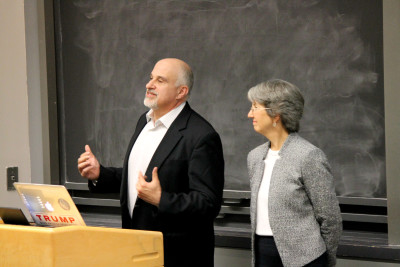
The Boston University Student Government Judicial Commission announced the launch of an investigation into misconduct within the SG Executive Board during their Senate meeting Monday. The documents and evidence received will be evaluated by the Judicial Commission and would lead to impeachment if necessary, Judicial Commissioner Tim Geraghty said during the meeting.
“We’re taking impeachment cases very seriously,” Geraghty, a senior in the College of Engineering, said after the meeting. “[Judicial Commissioners] will be meeting this week to discuss the [complaint] letter and evidence regarding complaints filed toward an E-board member.”
SG officials were not able to specify exactly which E-board member is under investigation and for what reason, since the investigation is ongoing.
In the past week, a petition was created calling for the resignation of SG Vice President of Finance Kimberly Barzola. Senate Chair Stephen Chang said the Judicial Commission would consider discussing Barzola’s impeachment if they received a letter detailing misconduct, The Daily Free Press reported Monday.
According to Article II, Section V of the SG Senate Bylaws, at least two senators should file a letter that details “reasons for misconduct or constitutional violations” for the Judicial Commission to evaluate and consider impeachment. The complainants would proceed to the Senate floor only after a two-thirds vote within Judicial Commission, the bylaws state.
Once on the Senate floor, “removal from office shall require a simple [two-thirds] majority vote of the Senators present at the meeting,” the bylaws state.
Chang, a senior in the College of Arts Sciences, said the investigation is private until Judicial Commission announces a hearing.
The meeting also allowed Senate to provide insights on BU’s general education requirements to members of the BU Task Force on General Education. Bruce Schulman, co-chair of the task force, said the group aims to get input from all stakeholders in the BU community.
“[We want] to get feedback so that we can take that into consideration and make it into a formal proposal,” Schulman, a professor in CAS, said in the meeting. “[General education] will be a keystone experience for all undergraduates to integrate core knowledge, skills and habits.”
The task force will focus on collaborative interdisciplinary courses and co-curricular experiences, Schulman said.
Elizabeth Loizeaux, another co-chair of the task force and associate provost for undergraduate affairs, said in the meeting that the general education requirement focuses on everything from critical thinking to creativity.
“We would like BU graduates to be intrepid and humble, resilient, self-sufficient and humble, introspective, and responsible, ethical, world-wide and curious,” the CAS professor said.
Several members of SG debated the pros and cons of the proposed general education requirement, but declined to comment on the launch of Judicial Commission’s investigation.
Camille McDaniel, communications committee chair and a freshman in the College of Communication, said the general education program would allow students to grow both academically and personally.
“It’s really awesome [that] so many deans and administrators at this school really care about our personal development and our versatility as people,” McDaniel said. “I’d really like to know more details about it.”
Daniel Collins, vice Senate chair and a sophomore in CAS, said he is concerned about the program’s possibility to take away students’ opportunities to double major or take a minor, which could change students’ academic pathways. Otherwise, Collins said, he looks forward to the positive impact the requirements could have.
“I like the idea of the task force and from what I hear from both my constituents in CAS as well as other Senate members, it seemed like people liked the idea of having the general requirements,” Collins said.
Sabina Razak, the co-director of SG’s department of academic affairs, said the task force is “at a point where it’s very theoretical.”
“I personally don’t really see the practical application of [general education requirement],” Razak, a sophomore in the Questrom School of Business, said. “Yet it is still something that will take a while to develop.”















































































































